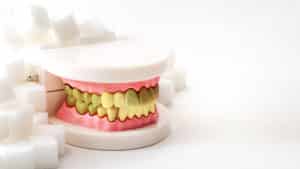Is Your Diet Hurting Your Teeth?


There are recommended guidelines for fruits, vegetables and more that should be included in a healthy, daily diet. Your diet can be poor or it can be great depending on what foods and drinks you choose. Foods high in carbohydrates, sugars and various acids will damage your teeth and will change their color over time. Other foods and drinks high in specific nutrients can build your teeth back up. Learn about foods and drinks that damage the teeth, what to eat and what to avoid if you want to have both a healthy body and healthy teeth!
Your Mouth and Digestion
Did you know that your oral health can affect your overall health? Many people don’t realize just how much their oral hygiene can affect their risk for disease and health problems. Countless chronic conditions are caused by nutritional deficiencies, problems with weight, viruses, bacteria that get into the body and other oral-related illnesses. Many viruses can get into your body through the mouth with eating, drinking, and touching things with the virus. Weight problems can start with the mouth as food is taken into the mouth in most cases.
Not only can your food determine how well your body runs and if your diet and hygiene habits set you at risk for chronic conditions, but your food can damage your teeth. When you eat, your mouth begins digestion by breaking your food into smaller pieces for digestion. Your teeth do the actual breaking up part, and some of that food gets left behind in the mouth. Saliva helps break down food with acids and bacteria in it. However, some of that bacteria will combine with sugars in the foods you eat to make an acidic film called plaque.

Plaque and Oral Health
Plaque is the part that gets left behind in your mouth as a film that coats your teeth. Because it is acidic, plaque can eat away at your teeth, weakening them over time and causing them to decay. If oral hygiene isn’t followed, plaque sits on the teeth for long periods and the oral health disease known as “tooth decay” happens. The teeth can decay and simultaneously, gum disease can set in. This is when acidic plaque irritates the gums to a high degree.
The gums become red, swollen, inflamed, can bleed easy and start to pull away from the teeth until tooth loss happens. Infections from both tooth decay and gum disease can get into your bloodstream, causing systemic illness. However, all of these issues never have to happen if you have great oral health.
How do you have great oral health? You brush and floss your teeth and see the dentist! The American Dental Association and other health organizations suggest:
- Brushing your teeth at least twice a day (minimum) for two minutes at a time. Brush all tooth surfaces with fluoride toothpaste.
- Floss 1-2 times a day, making sure to get up into the gum line and to scrape gently along your teeth as you go to remove plaque.
- Use fluoride products (toothpastes, mouthwashes, gels, etc.) to strengthen the teeth and to reduce your risk for tooth decay.
- Visit the dentist for comprehensive exams and dental cleanings at least biannually, which is every 6 months. There, tooth decay and gum disease signs can be found and treatment can stop the progression of both.

Is Your Diet Hurting Your Teeth?
You may practice great oral hygiene on your teeth and still have your teeth decay and weaken. What gives? The problem may be your diet. Some foods and drinks are acidic in nature. If there are acids in a food (like citrus fruits) or drink (sodas, citrus drinks, anything carbonated), then acid erosion will happen to your teeth. The biggest culprit is soda, as many soft drinks are carbonated. Carbonation gets that fizzy pop because of a chemical reaction taking place between carbon dioxide and water. This creates carbonic acid, which causes damage to the teeth.
You can’t just brush away the drink either. Studies show that acids in foods and drinks will stay on the teeth for 20-30 minutes working to break up the surface minerals of tooth enamel. If you brush your teeth within that time frame, you may actually take some extra layers off of your teeth. It’s best to drink these drinks sparingly, not at all, or using a straw so there is limited contact with the tooth enamel.
If you eat or drink products with acids in them frequently, you will notice your teeth becoming weaker or thinner overtime. They may physically look more gray or yellow, may show the inner tooth layers through more translucent tooth enamel, or they may break easier due to weakness. Choosing to drink water or milk can help build your teeth up, as water contains fluoride to protect the teeth and milk has calcium, phosphate and other minerals that can remineralize the teeth.
Watch Out for Sugar
Do you want to have stronger, healthier teeth? Avoid sugar! Sugar is naturally found in fruits. However, added sugars are not natural and work like acid when they combine with mouth bacteria. The more sugar you eat, the more plaque your mouth makes and the more your teeth can decay. If you eat less sugar and keep your teeth cleaner with oral hygiene measures, you can avoid tooth decay and gum disease.
These diseases are the most chronic ones that plague people in the U.S. and both can be prevented by a good diet low in sugar. If you find yourself with frequent cavities and gum issues, take a look at your diet and cut out the things that will hurt your smile. To get specific food items to avoid and tips for a healthier smile, call Dr. Ania’s office today at 303-443-0998!


